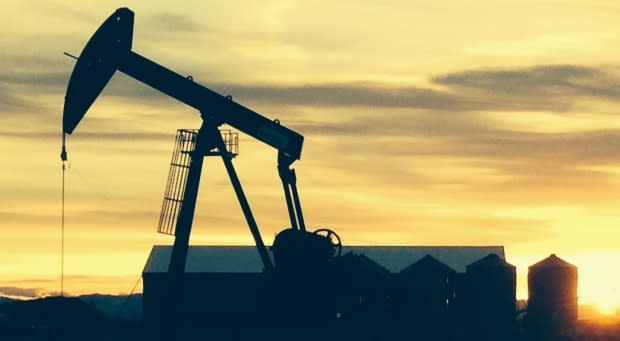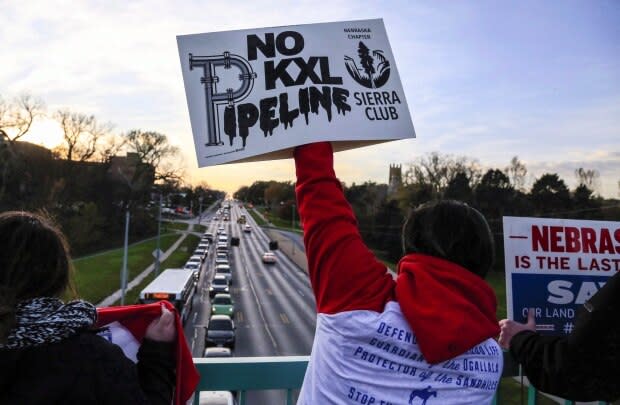OPINION | Alberta could be fighting its last pipeline battle
This column is an opinion from Max Fawcett, a freelance writer and the former editor of Alberta Oil magazine.

Just when it looked like Premier Jason Kenney was running out of pipeline battles to fight, Joe Biden handed him a gift.
Last Monday, the presumptive Democratic presidential nominee's campaign announced that he would cancel Keystone XL's permit if elected in November. And while both Kenney and Energy Minister Sonya Savage have resisted the temptation to take a swipe at Biden, it's hard to imagine they'll keep pulling their punches.
But maybe they should get them in while they still can. After all, it could easily be the last pipeline-related political fight we'll see in our lifetimes.
That's because, as with so many other aspects of our lives, COVID-19 is forcing a reassessment of our old assumptions about energy.
One of the most important assumptions, from Alberta's perspective, is that demand for oil will continue to grow for decades to come, as everyone from the International Energy Agency to OPEC has predicted.
But while physical distancing and the economic uncertainty it has created will decrease demand for oil in the near term, it's the longer-term consequences of COVID-19 that ought to be even more worrying for the oil and gas industry.
Impact on air travel
Take its impact on air travel, which had been expected to be an area of relative strength for oil demand going forward.
While market watchers were predicting a gradual decline in demand for motor gasoline and diesel over the next 30 years, they also saw a huge increase in passenger air travel that would effectively offset it.
The International Energy Agency's 2019 forecast, for example, saw passenger air travel growing from six trillion seat miles in 2018 to nearly 18 trillion by 2050.
BP's own forecast, meanwhile, predicted that jet fuel would account for 79 per cent of the overall growth in demand for refined products.

It's impossible to predict how COVID-19 will change these forecasts, or how long it will take us to accept being packed in like sardines on a flying tin can again. But Warren Buffett's decision in April to sell off all of Berkshire Hathaway's holdings in airline companies like Delta, United and American Airlines offered an interesting window into his perspective on the industry's future.
Buffett, after all, is usually a buyer during times of market turmoil, and other investors look to him for clues on what they should be doing.
"The world has changed for the airlines," he told shareholders during Berkshire Hathaway's annual meeting.
"I don't know how it's changed and I hope it corrects itself in a reasonably prompt way."
The airline industry isn't going to wait around for that to happen, though. Instead, they're going to use the downturn — and the stimulus funds that will almost certainly follow — to accelerate the turnover in their fleets.
As Boeing CEO Dave Calhoun told analysts during a recent earnings call, "replacements will not be uniform, as airlines will focus on the oldest and least efficient to retire."
'Could it be peak oil?'
For Bloomberg's Liam Denning and Brooke Sutherland, the passing of older-generation 747s isn't just a milestone in aviation history.
"It will also herald a fundamental shift in oil — toward peak demand."
They're not alone here.
Bernard Looney, BP's new CEO, told the Financial Times that he wasn't willing to discount the possibility that oil demand will never recover to where it was earlier this year, given the spectre of less air travel and more working from home.
"Could it be peak oil? Possibly. Possibly. I would not write that off," Looney said.

In a recent earnings call of their own, Shell executives signalled that they were bracing for the possibility.
CFO Jessica Uhl talked about "major demand destruction that we don't even know will come back," while CEO Ben van Beurden suggested that "a crisis like this has the potential to capitalize society into a different way of thinking, much as the Paris Agreement has had."
This isn't to suggest that, as Elizabeth May and Yves-François Blanchet argued recently, the oil industry is "dead." Instead, it's evolving — and that evolutionary process will mean that Alberta will have to recalibrate some of its expectations.
Diminishing importance of pipelines
One of the biggest changes will be the diminishing importance of new pipeline projects, which have been the overriding focus of Alberta politicians for more than a decade now.
If the Trans Mountain Expansion project goes through, the Line 3 Replacement is completed, and Keystone XL gets built, it's unlikely that Alberta will ever need another major oil pipeline.
In Alberta, this doesn't appear to have sunk in yet.
On May 5, in response to news that cargoes of Canadian oil might be making their way through the Panama Canal and up the eastern seaboard to Irving Oil's Saint John refinery, Kenney tweeted wistfully about how much better it would be if the Energy East pipeline was moving those barrels.
A few days later, Savage tweeted a passage from a Bloomberg story that summarizes the U.S. Energy Information Administration's 2019 reference case, which forecasts that "petroleum and other liquids will see their use increase through 2050, even as their share of global energy demand declines to 27 per cent from 32 per cent over that period."
What Savage failed to mention is that said reference case assumes no new efforts to deal with climate change, and a resulting three-degree increase in warming — a catastrophic outcome by almost any analysis.
By contrast, the International Energy Agency (not to be confused with the Energy Information Administration), plots out a different scenario. It models a world in which policies are implemented that put global emissions on track to meet Paris Agreement targets — and it sees demand for oil fall by 30 million barrels per day over the next 20 years.

Yes, the status quo that Savage's tweet effectively endorses is a more likely outcome than the aggressive climate policies the IEA's scenario would require, but it's the best case scenario as far as the oil and gas industry is concerned — and hardly one that's guaranteed to play out.
A rapidly changing landscape
That's particularly true if Biden, who is running on the most ambitious climate platform in American presidential history, ends up winning in November.
As New York Magazine's Gabriel Debenedetti noted in a recent piece, Biden has promised an "FDR-sized presidency," and those promises include working with Gov. Jay Inslee of Washington on a clean energy plan.
He'd be joined in that effort by South Korea, which just passed a new green deal that will see it invest $110 billion in climate-friendly stimulus, and by Germany, where Chancellor Angela Merkel has said that "if we set up economic stimulus programs, we must always keep a close eye on climate protection."
It will be difficult for a government that prides itself on its willingness to fight for one vision of the oil and gas industry to adapt to this rapidly changing landscape.
It will be tempting for it to continue railing against the federal government, environmental activists, and all of its other enemies, foreign and domestic. And if Biden wins the White House, and follows through on his pledge to cancel Keystone XL's presidential permit, that temptation may prove overwhelming.
But the ground has shifted under the Government of Alberta's feet, just as it has for all of us, due to COVID-19.
The sooner it comes to terms with that, and helps the rest of Alberta do the same, the better.
This column is an opinion. For more information about our commentary section, please read this editor's blog and our FAQ.


